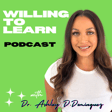
Empowering Voices with Dr. Van Lac on Youth Participatory Action Research
In this episode of Willing to Learn, we explore the realm of Youth Participatory Action Research (YPAR) with Dr. Van Lac, drawing from her insightful paper, 'The Good, the Bad and Ugly: an Autoethnographic Journey on Doing Participatory Action Research as a Graduate Student'. Dr. Lac shares her experiences navigating the intricacies of YPAR as a graduate student and now as an Associate Professor at the University of Illinois, Chicago. The conversation illuminates the challenges and triumphs of participatory research, emphasizing the crucial role of mentoring young researchers.
Throughout, Dr. Lac reflects on her journey from high school teacher to academic, offering rich insights into the intersections of education, research, and personal growth. She concludes with practical advice for aspiring YPAR practitioners, underscoring the importance of this approach in fostering inclusive, transformative educational practices.
Episode Resources:
- The Good, the Bad, and the Ugly: An Autoethnographic Journey on Doing Participatory Action Research as a Graduate Student - Link
- YPAR – Youth Participatory Action Research - Link
- Grassroots community organizing for education justice SIG – link
- Raza Studies: The Public Option for Educational Revolution - Link
Dr. Van Lacsocial and contact:
- @dr_vanlac
- lac@uic.edu
Willing To Learn Resources:
- Instagram - Dr. Ashley D. Domínguez @ashddominguez
- Instagram - Willing To Learn @willingtolearnpodcast
- Email: willingtolearnpodcast@gmail.com
- Produced by: Jeffrey Anthony
